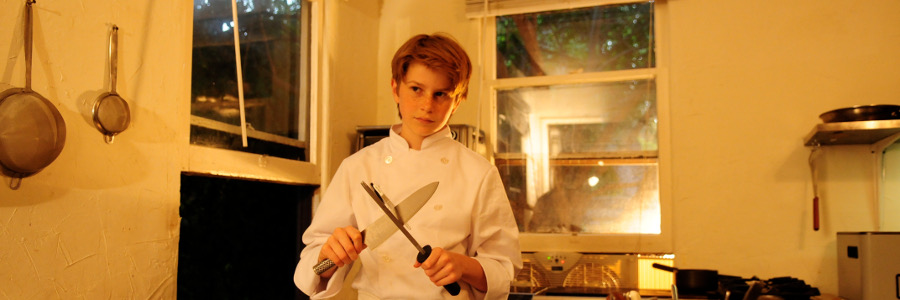Flynn McGarry opened his first restaurant to the public when he was 12. Sure, it was a supper club established in the family living room, and his bedroom doubled as a kitchen, but these details didn’t matter. Diners arrived in droves for one reason only: to experience food prepared by a boy with all the markings of a future fine dining icon.
Cameron Yates’s documentary Chef Flynn follows its subject from the first moment he decided to cook for his family, through his move to New York to develop a new restaurant. Featuring a trove of family footage shot by Flynn’s filmmaker mother, Meg McGarry, the doc has the rare opportunity to explore how prodigy’s develop their abilities. Instead, the focus lies heavily on how Flynn’s youth is perceived in the industry. This brings to bear several issues, resulting in a film that often prioritises palatability over substance, and is likely to leave audiences hungry for more.
That Flynn’s age would become such a hot topic is of no real surprise. As one critic notes, the average teenager has probably only learnt to boil water by the age Flynn was preparing eight-course, $160 a head dining experiences. The fact is, however, that despite his statement that “I had ten years of childhood. I think that’s enough”, Flynn was still a normal kid. He got shy when talking to chefs he respected. He wasn’t very eloquent or charming when presenting his dishes to guests. He liked playing outdoors. But to see the way he reacts when he spots a potential ingredient growing on the hill he’s sliding down is to recognise something special in him.

Highlighting that in order to explore what separates Flynn from other young culinarians might have proved an effective way of negating the criticism he faced after being featured on the cover of New York Times. Naysayers claim he received the feature because of his age. Chef Flynn argues it was despite his age. Taking some time to reflect on the evolution of Flynn’s work, or his philosophies on food, would go a long way in proving that, but they are entirely absent.
In their place are sequences that demonstrate Flynn’s ability as a chef, but once again, the only thing that sets him apart from everyone else here is the one thing Flynn doesn’t want to draw attention to: his age.
Another element of Flynn’s story – and the criticism it’s spawned – that Yates mostly glosses over is the question of privilege. Is it the thousands of dollars worth of equipment that Meg has installed in Flynn’s bedroom that gives him the ability to create such astounding food? Is it his family’s Hollywood connections that helped stir the initial buzz? The answer is yes, and no. It might not define Flynn’s ability, but it certainly gave him a leading edge.
Chef Flynn proves most interesting when Flynn is addressing his unconventional path to success, or Meg is talking about losing her identity as an artist to bolster her son’s. There’s no question a certain level of sacrifice was required. Yet by failing to acknowledge, or even scoffing at the suggestion that the equipment and family network played an important part in Flynn’s development, the documentary misses the opportunity to point out that yes, they played a part, but not the part that mattered.
At 19, Flynn is still physically boyish, and criticism of his path still lingers. His hope that he will one day be recognised as “…a person, no matter what age, who’s cooking” is a fair one. Chef Flynn had the potential to make that come true. However, despite it being a competently made documentary, its continued focus on the discussion of Flynn’s age is what stops it from reaching its full potential.
—
Chef Flynn screens March 7th and 10th
as part of ACMI’s Documentary Showcase.
